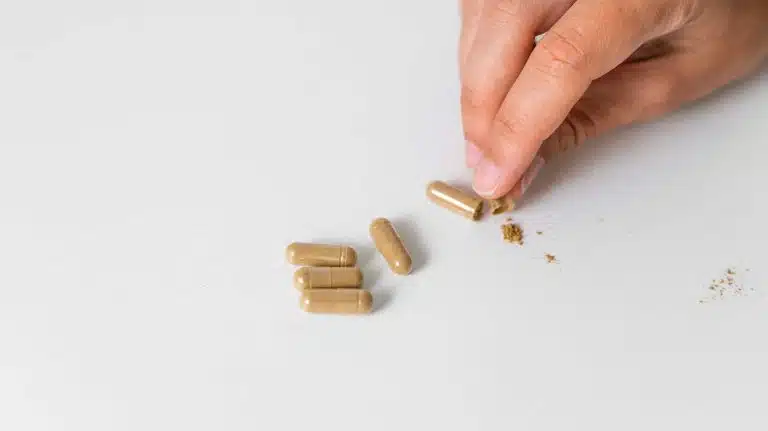Can MDMA Treat PTSD? | Clinical Trials & Risks

Posttraumatic stress disorder (PTSD) is a mental illness that can occur after you experience a traumatic event, such as military combat, sexual assault, or child abuse. Common PTSD symptoms include irritability, anxiety, depression, nightmares, and flashbacks.
The most common treatments for PTSD are psychotherapy and medication, particularly antidepressants. However, in recent years, scientists have been researching other possible treatments, including MDMA-assisted therapy.
What Is MDMA?
MDMA is a psychoactive drug that’s scientifically known as 3,4-Methylenedioxymethamphetamine. On the street, it’s often called “ecstasy” or “molly.”
Available as a capsule, tablet, liquid, or powder, MDMA first became popular at all-night dance parties or “raves.” It enhances the activity of the brain chemicals serotonin, dopamine, and norepinephrine.
Common effects of MDMA include:
- euphoria (intense joy)
- emotional warmth and openness
- increased energy
- increased sense of well-being
- increased sensory perceptions, such as brighter colors and louder sounds
- blurred vision
- sweating
- chills
- nausea
In general, MDMA’s effects start within 45 minutes of taking the drug and last for 3 to 6 hours.
Can MDMA Treat PTSD?
MDMA has not been legalized for any medical or recreational purposes. However, research suggests the drug may be useful in the treatment of posttraumatic stress disorder.
To treat PTSD, most mental health professionals recommend examining and processing traumatic memories with the help of a therapist. Researchers believe that MDMA may make it easier for people to process traumatic memories by:
- increasing the release of oxytocin, which is a hormone that can promote feelings of trust and reduce anxiety
- increasing a person’s sense of well-being, which can make traumatic memories seem less threatening
- increasing emotional openness, which can help people communicate more effectively with their therapists
Clinical Trials
Clinical trials of MDMA-assisted therapy are sponsored by the Multidisciplinary Association for Psychedelic Studies (MAPS).
In Phase 2 of these trials, 61% of the 107 participants no longer had PTSD after three sessions of MDMA-assisted therapy, and 68% no longer had PTSD at the 12-month follow-up.
These promising results prompted the U.S. Food and Drug Administration (FDA) to grant MDMA-assisted therapy the Breakthrough Therapy designation in 2017.
That means the FDA is currently supporting Phase 3 clinical trials of MDMA-assisted therapy. The trials are taking place in the United States, Canada, and Israel.
The trials involve multiple sessions of MDMA-assisted therapy, in which the therapist administers the drug to the patient in pill form and then helps the patient process traumatic memories.
A few hours later, when the effects of MDMA have worn off, the therapist and patient engage in follow-up talk therapy to further process the patient’s experience.
If the Phase 3 clinical trials continue to have positive results, the FDA may approve MDMA-assisted therapy for widespread usage for the treatment of PTSD.
MDMA Risks
Until MDMA-assisted therapy receives FDA approval, it’s available only to people who participate in the clinical trials. You should not try to treat your PTSD with illegally obtained MDMA.
Without the guidance of a mental health clinician, using MDMA poses a variety of health risks, including:
- high blood pressure
- irritability
- aggression
- trouble sleeping
- anxiety
- panic attacks
- depression
- seizures
- memory and attention problems
- loss of consciousness
In addition, if you take too much MDMA, you may experience a dangerous increase in body temperature that can lead to liver, kidney, or heart failure.
The drug can also raise your risk of HIV/AIDS and hepatitis. That’s because it impairs your judgment, making you more likely to engage in risky sexual behaviors.
Finally, many drug dealers add other substances to MDMA and then sell the drug as “pure MDMA.” That means you could accidentally use MDMA that contains additives like cocaine, methamphetamine, or synthetic cathinones (“bath salts”).
These substances pose significant health risks, including fatal overdose.
Is MDMA Addictive?
Researchers haven’t determined whether MDMA is addictive. However, some people may become physically dependent on the drug and experience withdrawal symptoms when they stop using it. These symptoms may include:
- depression
- fatigue
- loss of appetite
- trouble concentrating
If you or someone you love misuses MDMA, please contact an Ark Behavioral Health specialist to learn about our substance abuse and addiction treatment options.
Written by Ark Behavioral Health Editorial Team
©2024 Ark National Holdings, LLC. | All Rights Reserved.
This page does not provide medical advice.
Multidisciplinary Association for Psychedelic Studies - A Phase 3 Program of MDMA-Assisted Therapy for the Treatment of Severe Posttraumatic Stress Disorder (PTSD)
National Center for PTSD - Medication-Assisted Psychotherapy for PTSD
National Institute on Drug Abuse - What are the effects of MDMA?
National Institute on Drug Abuse - What is MDMA?
National Library of Medicine - MDMA-assisted psychotherapy for treatment of PTSD: study design and rationale for phase 3 trials based on pooled analysis of six phase 2 randomized controlled trials
Questions About Treatment?
Ark Behavioral Health offers 100% confidential substance abuse assessment and treatment placement tailored to your individual needs. Achieve long-term recovery.
100% confidential. We respect your privacy.
Prefer Texting?
Our friendly support team is here to chat 24/7. Opt out any time.







 Learn More
Learn More








